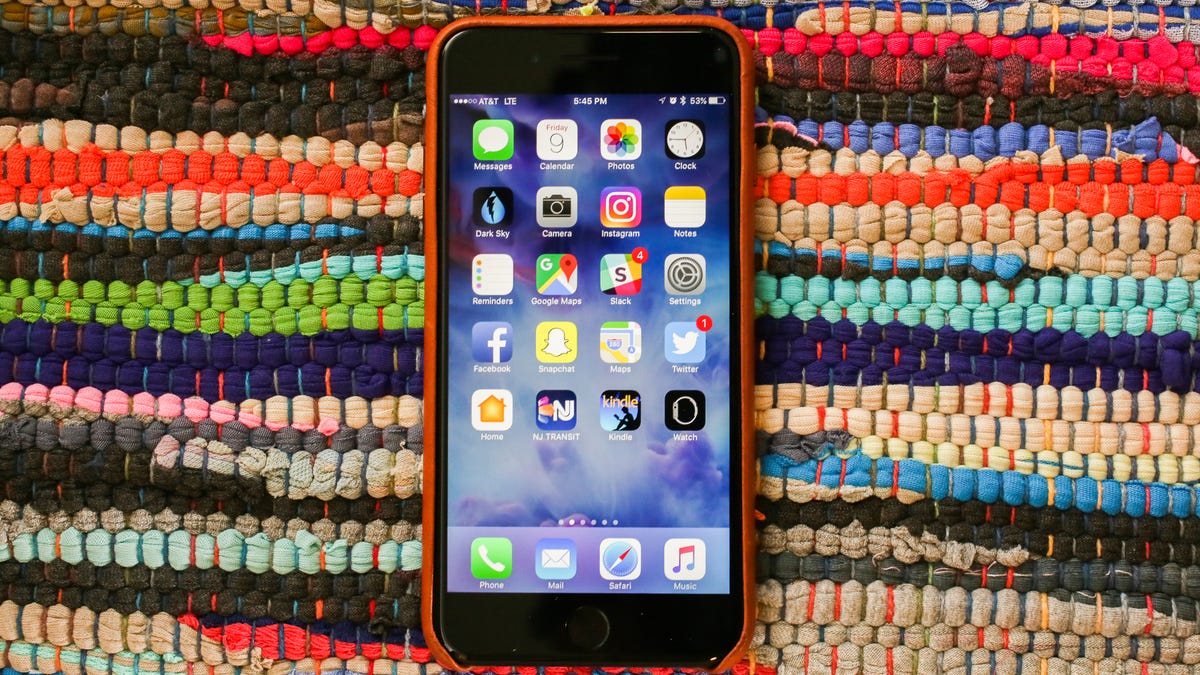Some iPhones may face US ban in Apple-Qualcomm legal tussle
But any possible ban -- which could cover the iPhone 7, 7 Plus and maybe even future iPhones -- probably wouldn't happen for at least 18 months.

Qualcomm wants the US International Trade Commission to ban the import of certain iPhones that don't use Qualcomm's chips.
If Qualcomm wins its latest legal battle against Apple , it could be a lot harder to buy certain iPhones in the US.
The company plans to file a complaint with the US International Trade Commission, accusing Apple's iPhones of infringing six of Qualcomm's mobile patents.
As part of the filing, Qualcomm wants the ITC to ban the import of certain iPhones that don't use Qualcomm chips, as well as ban Apple from selling devices it has already brought into the US.
The devices Qualcomm's seeking to ban would include iPhone 7 and 7 Plus models running on AT&T and T-Mobile, as well as certain iPads. Those devices use Intel's 4G chips, while phones from other carriers like Verizon use Qualcomm's processors. Those parameters limit the scope of the ban and also avoid hurting Qualcomm's chip business, which makes a lot of money from supplying to Apple.
"Apple continues to use our technology and not pay for it," Don Rosenberg, Qualcomm's general counsel, said in an interview. "They've really left us no choice but to say, 'You've got to stop this.'"
The ITC likely will start examining the complaint in August, Qualcomm said, with a trial expected next year. Rosenberg said a decision -- and possible iPhone ban -- likely wouldn't happen for about 18 months.
Along with the ITC filing, Qualcomm's also pursuing a new patent infringement case in the Southern District of California. Rosenberg believes that case will be put on hold until the ITC makes its decision.
Qualcomm's legal filings this week are the latest shots in its battle with Apple. The two companies have been fighting over patents since January, when Apple filed suit against Qualcomm in the US and said the wireless chipmaker didn't give fair licensing terms for its technology. It wants to pay a lower amount for using Qualcomm technology in its devices. Qualcomm maintains that no modern handset -- including the iPhone -- would have been possible "without relying upon Qualcomm's fundamental cellular technologies."
Apple referred CNET to previous comments about why it's pursuing legal action against Qualcomm. "Qualcomm's illegal business practices are harming Apple and the entire industry," it said last month. "We believe deeply in the value of intellectual property, but we shouldn't have to pay them for technology breakthroughs they have nothing to do with. We've always been willing to pay a fair rate for standard technology used in our products and since they've refused to negotiate reasonable terms we're asking the courts for help."
Intel declined to comment.
Duking it out
Qualcomm is the world's biggest provider of mobile chips, and it created some of the essential standards for connecting phones to cellular networks. The company derives a significant portion of its revenue from licensing that technology to hundreds of handset manufacturers and others. Because Qualcomm owns IP related to 3G and 4G phones, any handset maker building a device that connects to the newer networks has to pay it a licensing fee, even if they don't use Qualcomm's chips.
Apple previously paid the licensing fee through its manufacturers, but it stopped paying those royalties for devices sold during the March quarter. Apple said it's been trying to reach a licensing agreement with Qualcomm for more than five years, but said the terms offered by Qualcomm weren't fair.
Qualcomm says Apple has infringed six of its mobile patents.
The six patents at issue in Qualcomm's most recent filing aren't standard essential patents, Rosenberg said. All the patents were granted from 2013 to 2017, he added, and none is included in the patent licensing agreement Apple's biggest contract manufacturer, Foxconn, has with Qualcomm.
"They really help the performance and efficiency of a device while at the same time limiting power use so the battery is preserved," Rosenberg said.
One relates to the architecture of mobile graphics processors. It helps phones switch been high definition and lower quality graphics to save battery life.
Another patent relates to carrier aggregation, which takes different bands of radio frequencies (which mobile phones use to transmit data) and binds them together so your phone can pick up the speediest one available. Think of it as a three-lane highway where cars can weave back and forth depending on which lane has less traffic. Qualcomm's technology essentially lets you do something like stream a video from your phone on Facebook in high definition without compromising the video quality or killing your battery life.
The company's current filing covers phones like the iPhone 7 and 7 Plus. Rosenberg said it also could be expanded to include Apple's future iPhones, if it believes they infringe Qualcomm's technology.
It's unclear what the odds are for Qualcomm to succeed in its request for a ban.
Apple last year won a ban on certain Samsung phones that infringed its patents, but the devices were so old at the time of the ban, they weren't really sold in the US anymore.
"Given the way Qualcomm has narrowly defined the ITC complaint against Apple, I believe this is Qualcomm's best chance yet to win a favorable ruling," said Moor Insights & Strategy analyst Patrick Moorhead.
Originally published July 6 at 1:30 p.m. PT.
Updated at 2:05 p.m. PT: Added comment from Patrick Moorhead and noted Intel declining to comment. Updated at 3:55 p.m. PT: Added Apple comment.
Does the Mac still matter? Apple execs tell why the MacBook Pro was over four years in the making, and why we should care.
Tech Enabled: CNET chronicles tech's role in providing new kinds of accessibility.

